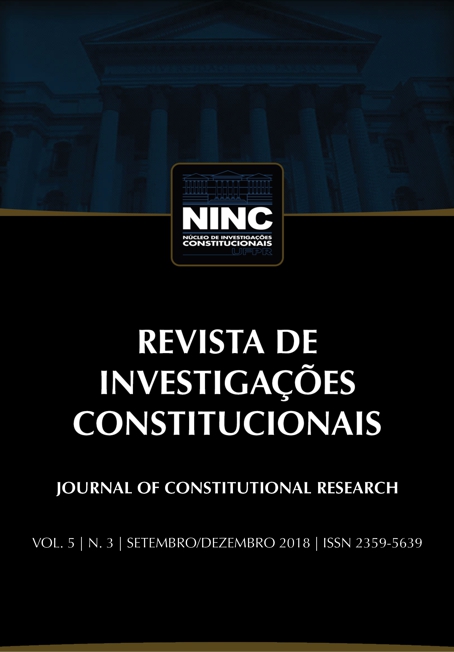O mito de Marbury v. Madison: a questão da fundação da supremacia judicial
DOI:
https://doi.org/10.5380/rinc.v5i3.56030Palavras-chave:
Marbury v. Madison, supremacia judicial, judicial review, constitucionalismo popular, departamentalismo.Resumo
Marbury desempenha um importante papel no debate sobre a legitimidade do judicial review no sistema constitucional norte-americano. Diante disso, o artigo objetiva analisar teses críticas ao uso retórico do caso com o objetivo principal de desconstruir o mito de Marbury que garantiu que o tornasse a principal fonte de reivindicação da supremacia judicial. Para tanto, analisa contribuições revisionistas a fim de identificar a atual e real causa do louvor à decisão. Tem enquanto foco demonstrar como as citações de Marbury pela Suprema Corte não são apenas para justificar o judicial review em casos controversos, mas principalmente para afirmar a superioridade ou exclusividade judicial na interpretação constitucional. No final, a análise histórica dos aspectos políticos do caso permite uma leitura contextualizada, restando claro que a decisão de Marshall afastou-se da doutrina da supremacia judicial para adotar uma postura consistente com as premissas do constitucionalismo popular.
Referências
ALSTYNE, William Van. A Critical Guide to Marbury v. Madison. Duke Law Journal, vol. 18, p. 1-47, 1969.
BICKEL. Alexander. The Least Dangerous Branch: The Supreme Court At The Bar Of Politics. New Haven: Yale University Press, 1962.
CHEMERINSKY, Erwin. Federal Jurisdiction. New York: Aspen Publishers, 2007.
CLINTON, Robert Lowry. Marbury V. Madison and Judicial Review. Lawrence: University of Kansas Press, 1989.
DOUGLAS, Davison. The Rhetorical Use Of Marbury V. Madison: The Emergence Of a "Great Case". Wake Forest Law Review, vol. 38, p. 375-413, 2003.
DWORKIN, Ronald. Freedom’s Law: The Moral Reading of the American Constitution. Cambridge: Harvard University Press, 1996.
FRIEDMAN, Barry. The Myths of Marbury. In: TUSHNET, Mark. (Ed.). Arguing Marbury v. Madison. California: Stanford University Press, 2005.
FRIEDMAN. Barry. The Will Of The People: How Public Opinion Has Influenced The Supreme Court And Shaped The Meaning Of The Constitution. New York: Farrar, Straus and Giroux, 2009.
GRABER, Mark. Establishing judicial review: Marbury and the judicial act of 1789. Tulsa Law Review, v. 38, n. 4, p. 609-650, 2003.
GRIFFIN, Stephen. The Age of Marbury: Judicial Review in a Democracy of Rights. In: TUSHNET, Mark. (Ed.). Arguing Marbury v. Madison. California: Stanford University Press, 2005
KENT, James. An Introductory Lecture To A Course Of Law Lectures, New York: Printed by Francis Childs, 1794. Disponível Em: <https://books.google.com.br/books?isbn=1886363919>. Acesso em 09 de mai. 2017.
KLARMAN, Michael. How Great were the 'Great' Marshall Court Decisions?. Virginia Law Review, vol. 87, p. 1111-1154, oct., 2001.
KRAMER, Larry. "The Interest of the Man": James Madison, Popular Constitutionalism, and the Theory of Deliberative Democracy. Valparaiso University Law Review, vol. 41, n. 2, p. 697-754, winter, 2006.
KRAMER, Larry. Generating Constitutional Meaning. California Law Review, vol. 94, n. 5, p. 1439-1453, oct. 2006.
KRAMER, Larry. Marbury And The Reatreat From Judicial Supremacy. Constitutional Commentary, Vol. 20, n. 2, p. 205-230, summer, 2003.
KRAMER, Larry. Popular Constitutionalism, Circa 2004. California Law Review, vol. 92, n. 4, p. 959-1011, jul. 2004.
KRAMER, Larry. The Pace and Cause of Change. Marshall Law Review, vol. 37, n. 2, p. 357-389, winter, 2004.
KRAMER, Larry. The People Themselves: Popular Constitutionalism and Judicial Review. New York: Oxford University Press, 2004.
KRAMER, Larry. The Supreme Court 2000 Term: Foreword: We the Court. Harvard Law Review, vol. 115, p. 4-169, jan., 2001.
MCREE, Griffith John. Life and Correspondence of James Iredell: One of the Associate Justices of the Supreme Court of the United States, D. Appleton, 1857. Disponível em: <https://books.google.com.br/books?id=e1F7AAAAMAAJ>. Acesso em 09 mai. 2017.
O'FALLON, James. Marbury. Stanford Law Review, vol. 44, n. 2, jan. p. 219-260, 1992.
RAKOVE, Jack. The Origins of Judicial Review: A Plea for New Contexts. Stanford Law Review, vol. 49, p. 1060-64, 1997.
RUGER, Theodore. "A Question Which Convulses A Nation": The Early Republic's Greatest Debate About Judicial Review Power. Harvard Law Review, vol. 117, p. 826-890, 2004.
SNOWISS, Sylvia. Judicial Review and the Law of the Constitution. New Haven: Yale University Press. 1990
The Federalist Papers, n. 78, 1788. Disponível em: <https://www.congress.gov/resources/display/content/The+Federalist+Papers>. Acesso em 09 mai. 2017.
TREANOR, William Michael. Judicial Review Before Marbury. Stanford Law Review, vol. 58, p. 455-462, 2005.
WHITTINGTON, Keith. Extrajudicial Constitutional Interpretation: Three Objections and Responses. North Carolina Law Review, vol. 80, n. 3, p. 773-852, 2002.
WHITTINGTON, Keith. Political Foundations of Judicial Supremacy. Princeton: Princeton University Press, 2007.
WHITTINGTON, Keith; RINDERLE, Amanda. Making A Mountain Out Of A Molehill? Marbury And The Construction Of The Constitutional Canon. Hastings Constitutional Law Quarterly, Forthcoming, fev. 2012. Disponível em: <https://ssrn.com/abstract=2003083>. Acesso em 09 mai 2017.
WOLFE, Christopher. The Rise Of Modern Judicial Review: From Constitutional Interpretation To Judge-Made Law, New York: Basic, 1986.
WOOD, Gordon. The Origins Of Judicial Review Revisited, Or How The Marshall Court Made More Out Of Less. Washington & Lee Law Review, vol. 56, n. 3, p. 787-803, 1999.
Downloads
Publicado
Como Citar
Edição
Seção
Licença
Autores que publicam nesta revista concordam com os seguintes termos:- Autores mantém os direitos autorais e concedem à revista o direito de primeira publicação, com o trabalho simultaneamente licenciado sob a Creative Commons - Atribuição 4.0 Internacional que permite o compartilhamento do trabalho com reconhecimento da autoria e publicação inicial nesta revista.
- Autores têm autorização para assumir contratos adicionais separadamente, para distribuição não-exclusiva da versão do trabalho publicada nesta revista (ex.: publicar em repositório institucional ou como capítulo de livro), com reconhecimento de autoria e publicação inicial nesta revista.
- Autores têm permissão e são estimulados a publicar e distribuir seu trabalho online (ex.: em repositórios institucionais ou na sua página pessoal) a qualquer ponto antes ou durante o processo editorial, já que isso pode gerar alterações produtivas, bem como aumentar o impacto e a citação do trabalho publicado (Veja O Efeito do Acesso Livre).
























